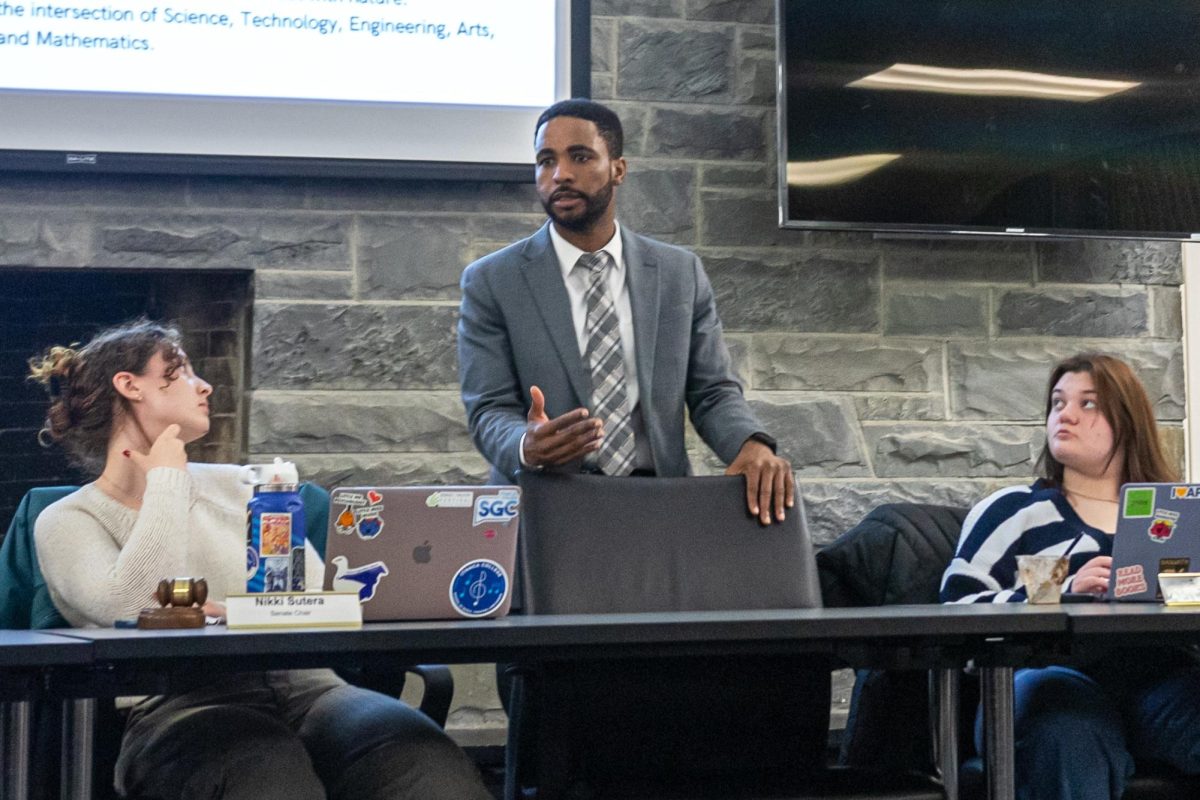The Ithaca College Student Governance Council met Feb. 3 to discuss upcoming changes to first-year student housing selection for Fall 2025.
SGC was joined by Stanley Bazile, vice president of Student Affairs and Campus Life; Laura Davis, director and interim assistant dean of Students in the Office of Residential Life; and Eileen Roth, assistant director for Residential Education and Assessment in Res Life.
The council also presented its Appropriations Report for Spring 2025. The SGC Appropriations Committee, which allocates funding for student organizations, allocated $36,039 for the semester.
Beginning in Fall 2025, all incoming first-year students will select from a list of 11 themed residential communities during their housing selection process, and their choice will place them in designated residence halls with students with similar interests. The themes include options like Lavender Living for students looking for a welcoming environment for LGBTQ+ identities, and “Leadership and Service” for students seeking participation in activities that hone their leadership skills. Other housing themes include: Creative Innovation, Discover Ithaca, Social Justice and Advocacy, Guild Living, Strive and Thrive, Sustainability, Quiet Study, Adventure Peak and Technology and Innovation.
Davis said a crucial motivator for the implementation of themed housing was to foster a greater sense of belonging and community. She said the results of the ICare Assessment in Fall 2023 and the 2024 Floor Feedback Survey revealed that 37% of respondents indicated feeling disconnected from their peers in their residence halls, and 18% reported difficulty adjusting to residential life on campus.
“The key goal in looking at broadening and re-envisioning themed housing on our campus is, how do we incorporate building another layer of engagement where we can support students who are connecting based on interests, passions and aspirations?” Davis said.
Roth said the themed housing model was inspired by the desire to expand the success of the college’s Residential Learning Communities, in which students of all academic standings can apply to live in designated residential halls with other students of similar interests or identities. She cited an RLC analysis conducted by the college from 2017 to 2022 which found that students in RLCs outperformed their peers in GPA, graduation rates and community engagement.
Bazile said that despite the benefits of living in an RLC, the success of the programs is hindered by low participation rates. According to Bazile, out of about 3,700 students currently living on campus, only about 8% live in an RLC. To combat low participation, themed housing selection will directly be integrated into the first-year housing selection process, unlike the RLC’s opt-in model.
Bazile laid out a five-year plan for the themed housing initiative comprising four phases. In phase one — representing the 2025–26 academic year — 100% of first-year students will participate in themed housing. In phase two — from 2026 to 2028 — 100% of first-year students and a target of 60% of sophomores will participate. In the third phase — from 2028 to 2029 — 100% of first-year students and sophomores will live in themed housing, and live-in learning initiatives will be implemented to incorporate academic courses within residence halls. By 2030, Bazile said he hopes to see the complete implementation of themed living across all residence halls.
“We know that if individuals are participating in [themed housing communities], it contributes to a better campus experience and also eventually contributes to becoming a global citizen,” Bazile said. “We have promised that when you leave IC, you leave IC different, and you change the world.”
Junior Noeline Luyindula, first-generation senator, posed a concern that themed living communities might lead to the formation of social bubbles in which students are confined to interactions with one set of people and are not given ample opportunities to interact with students outside their immediate theme.
Roth said themed living communities will not be designated to their own buildings, meaning that multiple themed communities will be present in each residential hall and each theme will be spread to different halls across campus. Roth also explained that the college will hold “cluster events,” in which members of neighboring themed housing communities can come together and socialize.
“Students can explore a passion or interest that is not necessarily [centered] around their theme,” Roth said. “It’s a layer of the college experience, not the end-all-be-all of the college experience, and so there will still be plenty of opportunities for students to meet outside of their residence hall.”
Amelia Grimshaw, Class of 2028 senator, asked the speakers if current students will be able to participate in themed housing.
Davis said that while the college will not restrict upperclassmen from requesting to live in a themed living community, its focus in the fall is on accommodating the needs of first-year students.
“While we don’t want to turn people away, we also want to make sure that we’re creating first-year communities with that unique kind of developmental bridge as they’re going into college,” Davis said.
Davis said returning students are still encouraged to apply to live in an RLC, which she said has been simplified for Fall 2025. In the past, students had to complete a separate form indicating interest in an RLC, but they will now be able to complete the process within the housing application form itself.
Junior Rishabh Sen, president of the student body, announced that there will be a vacancy for the position of student liaison to the alumni board for the next academic year. The position is currently held by senior Noah Richardson. Sen said the position will only be open to rising sophomores and juniors, and the candidate cannot hold any other position within SGC.
The SGC is the sole representative body for the Ithaca College student community. The SGC meets from 7–9 p.m. every Monday in the Taughannock Falls room of the Campus Center. The SGC can be contacted at [email protected].







